Submissions: 2022 July
Re: Submissions: 2022 July
Our sun is getting more active again and is really starting to show off. This image, taken on July 14th, shows it in all its glory as seen through an H-alpha telescope. This image was taken in 6 minutes gathering almost 100Gb of data to get this high resolution result.
Re: Submissions: 2022 July
Taken yesterday 15 July, At the rock of the virgin in Biarritz, the sunset with the black spots clearly visible at this moment
Canon 5d mark 3, sigma 150 600mm, at 600mm here

https://www.astrobin.com/full/pje58f/0/
Canon 5d mark 3, sigma 150 600mm, at 600mm here

https://www.astrobin.com/full/pje58f/0/
Last edited by bystander on Sat Jul 16, 2022 9:52 pm, edited 1 time in total.
Reason: Please, no hot links to images > 500 kb. Substituted smaller image.
Reason: Please, no hot links to images > 500 kb. Substituted smaller image.
-
Victor Lima
- Ensign
- Posts: 70
- Joined: Tue Apr 21, 2020 11:38 am
Re: Submissions: 2022 July
CATEGORY: Panoramic Single Shot
SOCIAL IG: @victorlimaphoto
STORY:
Image taken on the last night of my Photo Tour in the Atacama Desert in a swampy area that appears in the middle of the desert, thus attracting a diversity of animals that live in this region.
Centralized in the image is Cerro Colorado, a stratovolcano belonging to the Sairecabur volcanic group.
This image was taken on the last night of my Photo Tour in the Atacama Desert. The temperature in the place, presented by the car's thermostat, was in the range of -7 degrees Celsius, without considering the wind, which certainly gave a thermal sensation of even colder.
The Air Glow, characteristic of the Atacama region, dyed the sky in shades of green, yellow and red, while the Milky Way cloud stood out in the scene, visible in detail in the night of the Chilean altiplano.
EXIF:
Panoramic Single Shot
Canon 6Da | Sigma 20mm f/1.4 Art
4x 15 sec | f/1.8 | ISO 5000
 Atacama Desert by Victor Lima, no Flickr
Atacama Desert by Victor Lima, no Flickr
SOCIAL IG: @victorlimaphoto
STORY:
Image taken on the last night of my Photo Tour in the Atacama Desert in a swampy area that appears in the middle of the desert, thus attracting a diversity of animals that live in this region.
Centralized in the image is Cerro Colorado, a stratovolcano belonging to the Sairecabur volcanic group.
This image was taken on the last night of my Photo Tour in the Atacama Desert. The temperature in the place, presented by the car's thermostat, was in the range of -7 degrees Celsius, without considering the wind, which certainly gave a thermal sensation of even colder.
The Air Glow, characteristic of the Atacama region, dyed the sky in shades of green, yellow and red, while the Milky Way cloud stood out in the scene, visible in detail in the night of the Chilean altiplano.
EXIF:
Panoramic Single Shot
Canon 6Da | Sigma 20mm f/1.4 Art
4x 15 sec | f/1.8 | ISO 5000
 Atacama Desert by Victor Lima, no Flickr
Atacama Desert by Victor Lima, no FlickrRe: Submissions: 2022 July
Copyrights: Raul Villaverde, Domingo Pestana and Nicolas Romo.
Location: Ocentejo, Guadalajara, Spain
 IC 434 SHHB_2022 by Raul Villaverde, en Flickr
IC 434 SHHB_2022 by Raul Villaverde, en Flickr
Location: Ocentejo, Guadalajara, Spain
 IC 434 SHHB_2022 by Raul Villaverde, en Flickr
IC 434 SHHB_2022 by Raul Villaverde, en Flickr- the_astronomy_enthusiast
- Ensign
- Posts: 98
- Joined: Fri Apr 16, 2021 10:16 pm
- Contact:
Re: Submissions: 2022 July
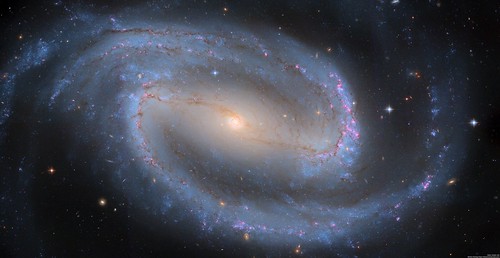
Rosy stellar explosions and cerulean stars: Hubble's view of the barred spiral galaxy NGC 1300. by William Ostling, on Flickr
Full write-up here: https://theastroenthusiast.com/barred-s ... om-hubble/
The Hubble telescope captured a display of starlight, glowing gas, and silhouetted dark clouds of interstellar dust in this 4-foot-by-8-foot image of the barred spiral galaxy NGC 1300. NGC 1300 is considered to be prototypical of barred spiral galaxies. Barred spirals differ from normal spiral galaxies in that the arms of the galaxy do not spiral all the way into the center, but are connected to the two ends of a straight bar of stars containing the nucleus at its center.
At Hubble’s resolution, a myriad of fine details, some of which have never before been seen, is seen throughout the galaxy’s arms, disk, bulge, and nucleus. Blue and red supergiant stars, star clusters, and star-forming regions are well resolved across the spiral arms, and dust lanes trace out fine structures in the disk and bar. Numerous more distant galaxies are visible in the background, and are seen even through the densest regions of NGC 1300.
In the core of the larger spiral structure of NGC 1300, the nucleus shows its own extraordinary and distinct “grand-design” spiral structure that is about 3,300 light-years (1 kiloparsec) long. Only galaxies with large-scale bars appear to have these grand-design inner disks – a spiral within a spiral. Models suggest that the gas in a bar can be funneled inwards, and then spiral into the center through the grand-design disk, where it can potentially fuel a central black hole. NGC 1300 is not known to have an active nucleus, however, indicating either that there is no black hole, or that it is not accreting matter.
Website: https://theastroenthusiast.com/
Instagram: https://www.instagram.com/the_astronomy_enthusiast/
- Sergio
- Friendly Neighborhood Astrophotographer
- Posts: 100
- Joined: Mon Aug 29, 2011 5:26 pm
- Location: Buenos Aires, Argentina
- Contact:
Re: Submissions: 2022 July
NGC 3199 Emission and Reflection Nebula in Carina (The Keel)
Hi all!!
Below an image of this bright emission and reflection nebula located 12,000 light years away in the southern constellation of Carina (the Keel). The nebula has an arc shaped form and covers a distance of 75 light years. Near the center of the ring is located a "short - lived" Wolf Rayet star HD 89358 or WR18. These type of stars are hot, luminous and are loosing mass in the form of stellar wind at a high rate. Apparently the bow shaped arc was formed out of the stellar wind ejected from WR18. These winds can create strong shockwaves when they collide with the comparatively cool interstellar medium, causing them to heat up anything in their vicinity.
More info at
http://www.baskies.com.ar/PHOTOS/NGC%20 ... ARGBV2.htm
Have a great week
Sergio
Hi all!!
Below an image of this bright emission and reflection nebula located 12,000 light years away in the southern constellation of Carina (the Keel). The nebula has an arc shaped form and covers a distance of 75 light years. Near the center of the ring is located a "short - lived" Wolf Rayet star HD 89358 or WR18. These type of stars are hot, luminous and are loosing mass in the form of stellar wind at a high rate. Apparently the bow shaped arc was formed out of the stellar wind ejected from WR18. These winds can create strong shockwaves when they collide with the comparatively cool interstellar medium, causing them to heat up anything in their vicinity.
More info at
http://www.baskies.com.ar/PHOTOS/NGC%20 ... ARGBV2.htm
Have a great week
Sergio
-
barretosmed
- Science Officer
- Posts: 463
- Joined: Thu Oct 12, 2017 6:04 pm
Re: Submissions: 2022 July
BEST MOMENTS
After numerous attempts, a frame came out with the faithful squire next to it.
BEST DETAILS:
https://www.astrobin.com/full/1ni8nu/0/
Equipment:
Canon 6D
Canon lens 24-105 f4
Single frame 25 seconds, ISO3200
07/01/2022
Munhoz - MG - Brazil
Copyright: FERNANDO OLIVEIRA DE MENEZES
EMAIL: BARRETOSMED@HOTMAIL.COM
After numerous attempts, a frame came out with the faithful squire next to it.
BEST DETAILS:
https://www.astrobin.com/full/1ni8nu/0/
Equipment:
Canon 6D
Canon lens 24-105 f4
Single frame 25 seconds, ISO3200
07/01/2022
Munhoz - MG - Brazil
Copyright: FERNANDO OLIVEIRA DE MENEZES
EMAIL: BARRETOSMED@HOTMAIL.COM
Re: Submissions: 2022 July
Starless Eagle Nebula and The Pillars of Creation
http://www.rolfolsenastrophotography.com
Copyright: Rolf Wahl Olsen Link to high resolution image: https://www.rolfolsenastrophotography.c ... -BgkdFm4/A
This image shows the famous Pillars of Creation region of the bright Eagle Nebula (Messier 16) in Serpens.
Constructed from monochrome exposures in two very narrow wavelength bands of ionised Hydrogen and Oxygen, the data has been combined into a colour image to reveal this highly detailed and very dramatic scene. The bright colours are due to emission from the ionised gases, energised by light from nearby stars. The stars were removed during image processing to fully reveal the intricate structure of the nebula. Orange-red nebulosity corresponds to H-Alpha emission, and the blue areas are OIII.
The core area of the nebula was made famous in 1995 as the "Pillars of Creation" by images from the Hubble Space Telescope. The pillars are giant columns of gas and dust, approximately 9 light-years long, that are slowly being eroded away by intense radiation pressure from nearby young stars.
The nebula lies 6000 light-years distant in the Sagittarius arm of our Milky Way galaxy.
Image details:
Date: Sep-Nov 2021, June 2022
Exposure: Ha OIII: 450:690 mins, total 19 hours @ -25C
Telescope: Homebuilt 12.5" f/4 Serrurier Truss Newtonian
Camera: QSI 683wsg with Lodestar guider
Filters: Astrodon 3nm Ha/OIII
Taken from my observatory in Auckland, New Zealand
http://www.rolfolsenastrophotography.com
Copyright: Rolf Wahl Olsen Link to high resolution image: https://www.rolfolsenastrophotography.c ... -BgkdFm4/A
This image shows the famous Pillars of Creation region of the bright Eagle Nebula (Messier 16) in Serpens.
Constructed from monochrome exposures in two very narrow wavelength bands of ionised Hydrogen and Oxygen, the data has been combined into a colour image to reveal this highly detailed and very dramatic scene. The bright colours are due to emission from the ionised gases, energised by light from nearby stars. The stars were removed during image processing to fully reveal the intricate structure of the nebula. Orange-red nebulosity corresponds to H-Alpha emission, and the blue areas are OIII.
The core area of the nebula was made famous in 1995 as the "Pillars of Creation" by images from the Hubble Space Telescope. The pillars are giant columns of gas and dust, approximately 9 light-years long, that are slowly being eroded away by intense radiation pressure from nearby young stars.
The nebula lies 6000 light-years distant in the Sagittarius arm of our Milky Way galaxy.
Image details:
Date: Sep-Nov 2021, June 2022
Exposure: Ha OIII: 450:690 mins, total 19 hours @ -25C
Telescope: Homebuilt 12.5" f/4 Serrurier Truss Newtonian
Camera: QSI 683wsg with Lodestar guider
Filters: Astrodon 3nm Ha/OIII
Taken from my observatory in Auckland, New Zealand
-
Mohamedusama19
- Ensign
- Posts: 10
- Joined: Fri Aug 20, 2021 11:51 am
Re: Submissions: 2022 July
Southern Ring Nebula JWST
Processed by Mohamed Usama Ismail - Ursamo Astrophotography
Copyright: NASA, ESA, CSA, STScI - Ursamo / Mohamed Usama Ismail
Southern Ring Nebula, NGC 3132, Eight-Burst Nebula -This work is based [in part] on observations made with the NASA/ESA/CSA James Webb Space Telescope. The data were obtained from the Mikulski Archive for Space Telescopes at the Space Telescope Science Institute, which is operated by the Association of Universities for Research in Astronomy, Inc., under NASA contract NAS 5-03127 for JWST.NIRCam
F090W, F187N,F212N,F356W,F405N,F470N
jw02733-o001_t001_nircam_clear-f090w_i2d.fits
jw02733-o001_t001_nircam_clear-f187n_i2d.fits
jw02733-o001_t001_nircam_clear-f212n_i2d.fits
jw02733-o001_t001_nircam_clear-f356w_i2d.fits
jw02733-o001_t001_nircam_f405n-f444w_i2d.fits
jw02733-o001_t001_nircam_f444w-f470n_i2d.fits
Facebook: https://www.facebook.com/UrsamoAstro/
Instagram: https://www.instagram.com/ursamo_astrophotography/
Website: https://mohamedusamaa19.wixsite.com/ursamo
Astrobin: https://www.astrobin.com/users/Mohamedusama19/

https://cdn.astrobin.com/thumbs/lvSUEcw ... iXfqJk.jpg
Processed by Mohamed Usama Ismail - Ursamo Astrophotography
Copyright: NASA, ESA, CSA, STScI - Ursamo / Mohamed Usama Ismail
Southern Ring Nebula, NGC 3132, Eight-Burst Nebula -This work is based [in part] on observations made with the NASA/ESA/CSA James Webb Space Telescope. The data were obtained from the Mikulski Archive for Space Telescopes at the Space Telescope Science Institute, which is operated by the Association of Universities for Research in Astronomy, Inc., under NASA contract NAS 5-03127 for JWST.NIRCam
F090W, F187N,F212N,F356W,F405N,F470N
jw02733-o001_t001_nircam_clear-f090w_i2d.fits
jw02733-o001_t001_nircam_clear-f187n_i2d.fits
jw02733-o001_t001_nircam_clear-f212n_i2d.fits
jw02733-o001_t001_nircam_clear-f356w_i2d.fits
jw02733-o001_t001_nircam_f405n-f444w_i2d.fits
jw02733-o001_t001_nircam_f444w-f470n_i2d.fits
Facebook: https://www.facebook.com/UrsamoAstro/
Instagram: https://www.instagram.com/ursamo_astrophotography/
Website: https://mohamedusamaa19.wixsite.com/ursamo
Astrobin: https://www.astrobin.com/users/Mohamedusama19/

https://cdn.astrobin.com/thumbs/lvSUEcw ... iXfqJk.jpg
Last edited by bystander on Mon Jul 18, 2022 5:06 am, edited 1 time in total.
Reason: Please, no hot links to images > 500 kb. Substituted smaller image.
Reason: Please, no hot links to images > 500 kb. Substituted smaller image.
Re: Submissions: 2022 July
The Farthest Sun and The nearest Moon of 2022
Angular sizes Comparison
JULY 2O22, Cairo, Egypt
On 4th July the earth was at its Apogee and it was at the Farthest point from the sun 152.1 Mio.Km and the apparent Diameter / Angular size of the Sun was 31.5'
On 13 July the Full Buck Moon, the moon was at the nearest point to the earth and it was a super Moon, But on 14 July the apparent diameter/ angular size of the Moon was 33.6' it is considered the largest apparent diameter of the Moon.
The photo illustrate that the size of the Sun on 16 July 2022 at 10:40 UT was 31.5' it was almost same as the size at the aphelion , compared with the size of the Moon 33.6' on 14 July 2022 at 23:25 UT, also the sun is full of solar Flares and 11 visible sunspots.
 Sun-Fartherst-and-nearest-moon-2 by osama Fathi, on Flickr
Sun-Fartherst-and-nearest-moon-2 by osama Fathi, on Flickr
S
The apparent diameter of the Moon is larger than the apparent diameter of the Sun by 6.666%
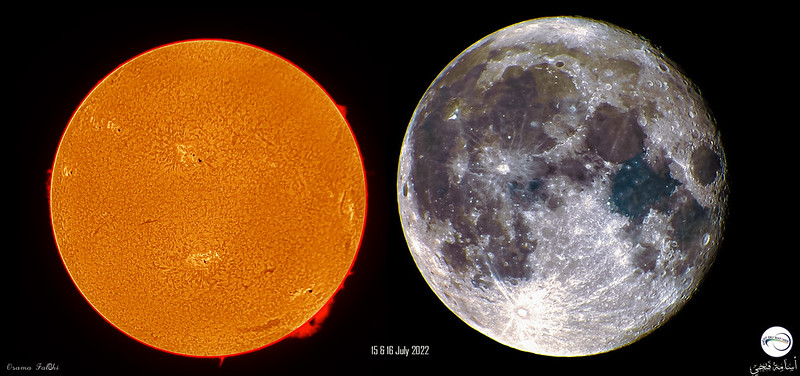 Sun-Fartherst-and-nearest-moon-wITHOUT-LABELS-WITHOU-LINES-- by osama Fathi, on Flickr
Sun-Fartherst-and-nearest-moon-wITHOUT-LABELS-WITHOU-LINES-- by osama Fathi, on Flickr
Gears:
For Sun :Skywatcher staradventurer tracker , RedCat 51, DayStar Quark Chromosphere , UV-IR cut filter , Nikon Z6
For the Moon: Skywatcher staradventurer tracker , RedCat 51, Celesetron 3X barlow, Nikon Z6
Settings :
Sun: Julian Date: 2459776.94444, Diameter: 31.5‘, Distance: 152.05, Mio.Km
Video 1/25", ISO 250, 576 Frames
Moon :Julian Date: 2459775.469248 , Diameter 33.6‘ , Distance 359688Km
Video 1/100", ISO 640, 973 Frames
Processing:
PIPP to convert video to TIFF frames , Autostakkert 3 for stacking , Adobe Photoshop
Also you can find the raw video of comparison the angular sizes of the Sun and the Moon in this Link:
https://drive.google.com/file/d/1vut5PU ... sp=sharing
Credit: Osama Fat'hi
https://www.instagram.com/osama.fathi.nswatcher85/
Cairo, Egypt
Angular sizes Comparison
JULY 2O22, Cairo, Egypt
On 4th July the earth was at its Apogee and it was at the Farthest point from the sun 152.1 Mio.Km and the apparent Diameter / Angular size of the Sun was 31.5'
On 13 July the Full Buck Moon, the moon was at the nearest point to the earth and it was a super Moon, But on 14 July the apparent diameter/ angular size of the Moon was 33.6' it is considered the largest apparent diameter of the Moon.
The photo illustrate that the size of the Sun on 16 July 2022 at 10:40 UT was 31.5' it was almost same as the size at the aphelion , compared with the size of the Moon 33.6' on 14 July 2022 at 23:25 UT, also the sun is full of solar Flares and 11 visible sunspots.
 Sun-Fartherst-and-nearest-moon-2 by osama Fathi, on Flickr
Sun-Fartherst-and-nearest-moon-2 by osama Fathi, on Flickr S
The apparent diameter of the Moon is larger than the apparent diameter of the Sun by 6.666%
 Sun-Fartherst-and-nearest-moon-wITHOUT-LABELS-WITHOU-LINES-- by osama Fathi, on Flickr
Sun-Fartherst-and-nearest-moon-wITHOUT-LABELS-WITHOU-LINES-- by osama Fathi, on FlickrGears:
For Sun :Skywatcher staradventurer tracker , RedCat 51, DayStar Quark Chromosphere , UV-IR cut filter , Nikon Z6
For the Moon: Skywatcher staradventurer tracker , RedCat 51, Celesetron 3X barlow, Nikon Z6
Settings :
Sun: Julian Date: 2459776.94444, Diameter: 31.5‘, Distance: 152.05, Mio.Km
Video 1/25", ISO 250, 576 Frames
Moon :Julian Date: 2459775.469248 , Diameter 33.6‘ , Distance 359688Km
Video 1/100", ISO 640, 973 Frames
Processing:
PIPP to convert video to TIFF frames , Autostakkert 3 for stacking , Adobe Photoshop
Also you can find the raw video of comparison the angular sizes of the Sun and the Moon in this Link:
https://drive.google.com/file/d/1vut5PU ... sp=sharing
Credit: Osama Fat'hi
https://www.instagram.com/osama.fathi.nswatcher85/
Cairo, Egypt
Last edited by astrosama on Tue Jul 19, 2022 12:03 pm, edited 7 times in total.
Re: Submissions: 2022 July
North America Nebula and Pelican Nebula in Vivid HOO
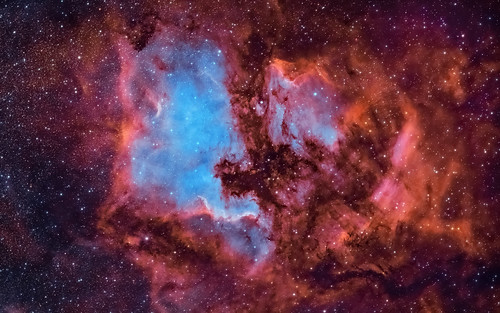 NAN HOO Vivid AB by Ahmed Waddah, on Flickr
NAN HOO Vivid AB by Ahmed Waddah, on Flickr
29/5/2022
Nikon Z6II - Ha Modified
SWSA - Unguided
Redcat 51 - ISO 6400 - 65 x 300"
Total Integration: 5h 25'
Antlia ALP-T Dual Band 5nm Filter
Valley of Whales, Egypt
Bortle 2
https://www.astrobin.com/dbjyei/
Copyright: Ahmed Waddah/ Waddah Photography
Facebook: https://www.facebook.com/waddah.photography
Astrobin: https://www.astrobin.com/users/WolfHeart/
IG: https://www.instagram.com/waddahphotography/
 NAN HOO Vivid AB by Ahmed Waddah, on Flickr
NAN HOO Vivid AB by Ahmed Waddah, on Flickr29/5/2022
Nikon Z6II - Ha Modified
SWSA - Unguided
Redcat 51 - ISO 6400 - 65 x 300"
Total Integration: 5h 25'
Antlia ALP-T Dual Band 5nm Filter
Valley of Whales, Egypt
Bortle 2
https://www.astrobin.com/dbjyei/
Copyright: Ahmed Waddah/ Waddah Photography
Facebook: https://www.facebook.com/waddah.photography
Astrobin: https://www.astrobin.com/users/WolfHeart/
IG: https://www.instagram.com/waddahphotography/
-
jldauvergne
- Ensign
- Posts: 88
- Joined: Wed Aug 25, 2010 9:11 am
Re: Submissions: 2022 July
Iapetus pass in front of Saturn, next rendez-vous : 2052!
2 days ago, Iapetus passed in front of Saturn and it's very rare, next rendez-vous is in 2052. It's very small, just 0,23", it's about the size of a coin at 20 km. I made this image from my balcony in Paris. Fortunatly seeing was good this night.
https://twitter.com/JLucDauvergne
Copyright: Jean-Luc Dauvergne
2 days ago, Iapetus passed in front of Saturn and it's very rare, next rendez-vous is in 2052. It's very small, just 0,23", it's about the size of a coin at 20 km. I made this image from my balcony in Paris. Fortunatly seeing was good this night.
https://twitter.com/JLucDauvergne
Copyright: Jean-Luc Dauvergne
-
JohanBogaerts
- Asternaut
- Posts: 1
- Joined: Wed Jul 20, 2022 12:29 pm
The Cygnus Wall from my backyard
Original on Flickr: https://www.flickr.com/photos/145194967 ... ed-public/
This image is the result of reprocessing data from last year.
Only smallband filters used in a SHO combination.
Exposure times: Oiii 125 x 180", Ha 70 x 180", Sii 146 x 180"
Used Equipment: Esprit 120ED, HEQ5 pro, Astronomik 6nm filters, Esatto 3" focusser, Arco 3" rotator, QHY filterwheel, QHY 268M camera at -15°C
Loacated in Sint Truiden Belgium, in a Bortle 5 environment.
Image processing mainly with PixInsight and some tweeking with ON1.
I hope this image is of sufficient quality to be in this forum.
Clear skies,
Johan
This image is the result of reprocessing data from last year.
Only smallband filters used in a SHO combination.
Exposure times: Oiii 125 x 180", Ha 70 x 180", Sii 146 x 180"
Used Equipment: Esprit 120ED, HEQ5 pro, Astronomik 6nm filters, Esatto 3" focusser, Arco 3" rotator, QHY filterwheel, QHY 268M camera at -15°C
Loacated in Sint Truiden Belgium, in a Bortle 5 environment.
Image processing mainly with PixInsight and some tweeking with ON1.
I hope this image is of sufficient quality to be in this forum.
Clear skies,
Johan
-
barretosmed
- Science Officer
- Posts: 463
- Joined: Thu Oct 12, 2017 6:04 pm
Re: Submissions: 2022 July
MOMENTS..
This image I left in shades of gray, to incorporate another environment, to show, all the rush of friends getting ready for dusk, the small mist between the hills, the lunar twilight, starting a night of observation.
Trying to report unique moments (you know when you take that old photo of your grandfather, crumpled in black and white, and you keep remembering what that time was like?). In this photo, I was passing by, and I saw our friends getting ready, that rush, the cold increasing, I thanked God for being there at that moment, so I wanted to report that image, a friend doing FLAT, to improve the quality of his images, another preparing his telescope, for an initiation into astrophotography, and another, with his observational telescope, discovering the universe.
There are things in our life that we can't go back, but we can try to keep memories of unique moments for the rest of our lives.
HAPPY FRIEND'S DAY
BEST DETAILS:
https://www.astrobin.com/full/gbqgzr/0/
EQUIPMENT:
Canon 6D
Canon lens 24-105 f4
LOCATION: Munhoz - MG
DATES: 07/01/2022
Copyright: Fernando Oliveira de Menezes
(Organizing author of the book Amateur Astrophotography in Brazil)
https://clubedeautores.com.br/livro/ast ... -no-brasil
This image I left in shades of gray, to incorporate another environment, to show, all the rush of friends getting ready for dusk, the small mist between the hills, the lunar twilight, starting a night of observation.
Trying to report unique moments (you know when you take that old photo of your grandfather, crumpled in black and white, and you keep remembering what that time was like?). In this photo, I was passing by, and I saw our friends getting ready, that rush, the cold increasing, I thanked God for being there at that moment, so I wanted to report that image, a friend doing FLAT, to improve the quality of his images, another preparing his telescope, for an initiation into astrophotography, and another, with his observational telescope, discovering the universe.
There are things in our life that we can't go back, but we can try to keep memories of unique moments for the rest of our lives.
HAPPY FRIEND'S DAY
BEST DETAILS:
https://www.astrobin.com/full/gbqgzr/0/
EQUIPMENT:
Canon 6D
Canon lens 24-105 f4
LOCATION: Munhoz - MG
DATES: 07/01/2022
Copyright: Fernando Oliveira de Menezes
(Organizing author of the book Amateur Astrophotography in Brazil)
https://clubedeautores.com.br/livro/ast ... -no-brasil
Re: Submissions: 2022 July
Here is my attempt at the Elephant Trunk Nebula, taken 14/15 July 2022; 6 hours total of Ha, Sii, & Oiii mapped to the Hubble pallet and adjusted for gold/turquoise. First time I have use the Celestron .7 focal reducer with the EdgeHD 9.25.
Elephant Trunk Nebula (IC 1396A)
July 14/15, 2022
Ellicott City, MD
Imaging Telescope: Celestron EdgeHD 9.25" with .7 focal reducer
Imaging Camera: ASI1600mm Pro
Mount: SkyWatcher EQ6-R Pro
Guiding Telescope: ZWO Mini Guider Scope
Guiding Camera: ASI290mm Mini
Filters: Ha Sii Oiii
Controller/Capture: ASIAIR Plus
Processed in DSS, Photoshop CC with Astronomy Tools
Frames/Subs
Lights 40 x 180 sec per filter
Darks 60 x 180 sec
Flats 60 per filter
Bias 60 x .001 sec
Total lights integration time: 6.0 hours
Regards,
Greg
Elephant Trunk Nebula (IC 1396A)
July 14/15, 2022
Ellicott City, MD
Imaging Telescope: Celestron EdgeHD 9.25" with .7 focal reducer
Imaging Camera: ASI1600mm Pro
Mount: SkyWatcher EQ6-R Pro
Guiding Telescope: ZWO Mini Guider Scope
Guiding Camera: ASI290mm Mini
Filters: Ha Sii Oiii
Controller/Capture: ASIAIR Plus
Processed in DSS, Photoshop CC with Astronomy Tools
Frames/Subs
Lights 40 x 180 sec per filter
Darks 60 x 180 sec
Flats 60 per filter
Bias 60 x .001 sec
Total lights integration time: 6.0 hours
Regards,
Greg
Last edited by bystander on Thu Jul 21, 2022 9:05 am, edited 2 times in total.
Reason: all <img> tags require image urls not page urls
Reason: all <img> tags require image urls not page urls
-
Meiying Lee
- Ensign
- Posts: 65
- Joined: Sun Aug 15, 2021 8:28 am
Re: Submissions: 2022 July
22 degree lunar halo, Moon Dogs and Parhelic Circle
Photo description:
As soon as the moon rose from the east on the evening of July 16, I saw the rare 22 degree lunar halo, Moon Dogs and Parhelic Circle! This beautiful and rare phenomenon lasted for about 3 hours, although the thin clouds interfered but did not affect the observation. The location and shape of the Moon Dogs change with the height of the moon in a time-lapse video linked here: https://youtu.be/wu_MrLqQxQA.
There is actually a faint starry sky above the film, but it looks dim under the influence of urban light pollution and moonlight.
Equipment Details:Canon EOS 6D + 14mm Lens
Post-processing Details:This photo was created by overlaying 51 photos with a total exposure of 13 minutes using Sequator software.
Location : Taipei, Taiwan
Time: July 16, 2022 10:11pm to10:24pm
photographer : Meiying Lee (李美英)
Photo description:
As soon as the moon rose from the east on the evening of July 16, I saw the rare 22 degree lunar halo, Moon Dogs and Parhelic Circle! This beautiful and rare phenomenon lasted for about 3 hours, although the thin clouds interfered but did not affect the observation. The location and shape of the Moon Dogs change with the height of the moon in a time-lapse video linked here: https://youtu.be/wu_MrLqQxQA.
There is actually a faint starry sky above the film, but it looks dim under the influence of urban light pollution and moonlight.
Equipment Details:Canon EOS 6D + 14mm Lens
Post-processing Details:This photo was created by overlaying 51 photos with a total exposure of 13 minutes using Sequator software.
Location : Taipei, Taiwan
Time: July 16, 2022 10:11pm to10:24pm
photographer : Meiying Lee (李美英)
Click to play embedded YouTube video.
-
Mathieu80
Re: Submissions: 2022 July
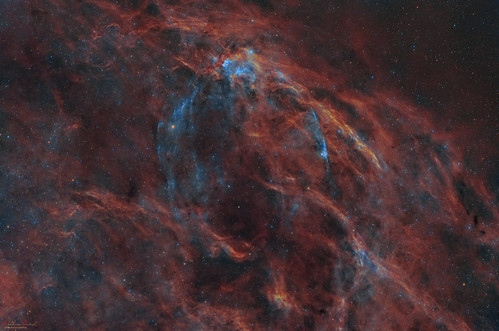 SNR G82-2+5.3 The Cygnus Shell supernova remnant (W63)SNR G82-2+5.3 The Cygnus Shell supernova remnant (W63) by Mathieu Guinot, sur Flickr
SNR G82-2+5.3 The Cygnus Shell supernova remnant (W63)SNR G82-2+5.3 The Cygnus Shell supernova remnant (W63) by Mathieu Guinot, sur FlickrThe ghost of a long-dead star, the W63 supernova remnant shines like a faint cosmic smoke-ring along the plane of the Milky Way galaxy toward the northern constellation Cygnus the swan, about 5000 light-years away. It is a beautiful elliptical SNR not so far from the more famous Cygnus loop SNR. It spans over 95x65' and is quite weak.
I decided for my first light with the little Taka FS60 to go deep into this one and it took quite a while to get enough SNR to bring the fainter areas of Oiii. I chose an HOO-RGB rendition instead of the most popular SHO renditions of this SNR.
Integration:
47h 20 from 9 june to 8 july 2022
H-alpha: 184x300" (15h 20')
Oxygen III: 348x300" (29h)
Blue: 30x120" (1h)
Green: 30x120" (1h)
Red: 30x120" (1h)
-
Kokanee
Re: Submissions: 2022 July

The Head of Scorpius
A beautiful patch of the summer sky in the Northern hemisphere. Over here we can find reflection, emission and dark nebulas. A globular cluster (M4), Antares ("not Mars") and rho Ophiuchi (a double star) just add to the mix.
19 images at ISO 800, 3 min's, were stacked to give a total integration time of close to one hour. Equipment used to take the photos was: a William Optics Star 71 travel scope mated to a Canon EOS Ra, mounted on a Vixen Sphinx SXW german equatorial mount.
Last edited by bystander on Fri Jul 22, 2022 1:03 am, edited 1 time in total.
Reason: all <img> tags require image urls not page urls
Reason: all <img> tags require image urls not page urls
Re: Submissions: 2022 July
Propeller Nebula
Click on above to enlarge
Full info and higher resolution @ https://www.kinchastro.com/propeller-nebula-2022.html
Click on above to enlarge
Full info and higher resolution @ https://www.kinchastro.com/propeller-nebula-2022.html
- Sergio
- Friendly Neighborhood Astrophotographer
- Posts: 100
- Joined: Mon Aug 29, 2011 5:26 pm
- Location: Buenos Aires, Argentina
- Contact:
Re: Submissions: 2022 July
Lambda Centauri Region
A wide field image showing a crowded field of view of 4º 30' x 3º 22'. The bright star is Lambda Centauri shining at magnitude 3,1 just 410 light years away from Earth. IC2944 is a large HII region (star forming cloud) also known as RCW 42 and Gum 43. The cluster of hot blue stars to the south left are illuminating the gases of IC2944 and causing it to glow in the red and magenta color. The nebula complex covers a distance of 100 light years and is located close to the plane of the Milky Way, therefore a crowded star field is present in all the frame.
Many other objects are visible in the image. See the main ones annotated in the below image.
More info and high resolution image at
http://www.baskies.com.ar/PHOTOS/IC%202 ... EFIELD.htm
Cheers to all
Sergio
A wide field image showing a crowded field of view of 4º 30' x 3º 22'. The bright star is Lambda Centauri shining at magnitude 3,1 just 410 light years away from Earth. IC2944 is a large HII region (star forming cloud) also known as RCW 42 and Gum 43. The cluster of hot blue stars to the south left are illuminating the gases of IC2944 and causing it to glow in the red and magenta color. The nebula complex covers a distance of 100 light years and is located close to the plane of the Milky Way, therefore a crowded star field is present in all the frame.
Many other objects are visible in the image. See the main ones annotated in the below image.
More info and high resolution image at
http://www.baskies.com.ar/PHOTOS/IC%202 ... EFIELD.htm
Cheers to all
Sergio
Last edited by Sergio on Sat Jul 23, 2022 7:05 pm, edited 3 times in total.
-
salvatorecerruto
- Ensign
- Posts: 21
- Joined: Thu Aug 22, 2019 2:28 pm
Re: Submissions: 2022 July
The Moon-Pleiades conjunction in the Sicilian countryside
Description: The beautiful Moon-Pleiades conjunction of this night. The Moon and the seven sisters position themselves delicately above the two olive trees. The Sicilian countryside, the chirping of cicadas, the hay cut recently, are the setting for this spectacle of the sky.
Technical data: Nikon D800 + Sigma 35mm f / 1.4 ART @ f / 2.8, 13 sec, ISO-1250
Location: Modica, Sicily, Italy
Date: 2022-07-23
Salvatore Cerruto
 The Moon-Pleiades conjunction in the Sicilian countryside by Salvatore Cerruto, su Flickr
The Moon-Pleiades conjunction in the Sicilian countryside by Salvatore Cerruto, su Flickr
Description: The beautiful Moon-Pleiades conjunction of this night. The Moon and the seven sisters position themselves delicately above the two olive trees. The Sicilian countryside, the chirping of cicadas, the hay cut recently, are the setting for this spectacle of the sky.
Technical data: Nikon D800 + Sigma 35mm f / 1.4 ART @ f / 2.8, 13 sec, ISO-1250
Location: Modica, Sicily, Italy
Date: 2022-07-23
Salvatore Cerruto
 The Moon-Pleiades conjunction in the Sicilian countryside by Salvatore Cerruto, su Flickr
The Moon-Pleiades conjunction in the Sicilian countryside by Salvatore Cerruto, su Flickr-
salvatorecerruto
- Ensign
- Posts: 21
- Joined: Thu Aug 22, 2019 2:28 pm
Re: Submissions: 2022 July
Conjunction between the Moon and the Pleiades
Description: The ashen moon rises, together with the Pleiades, over the Sicilian countryside. I slightly highlighted the Pleiades in post production to highlight their magnitude with respect to the Moon. A suggestive picture of last night surrounded by the chirping of cicadas and the smell of harvested hay.
Technical data: Nikon D800 + Tamron 100-400 f/4.5-6.3 @100mm, f/5, 8 sec, ISO-1250
Date: 2022-07-23
Location: Modica, Sicily, Italy (36.9263067,14.7904282)
Salvatore Cerruto
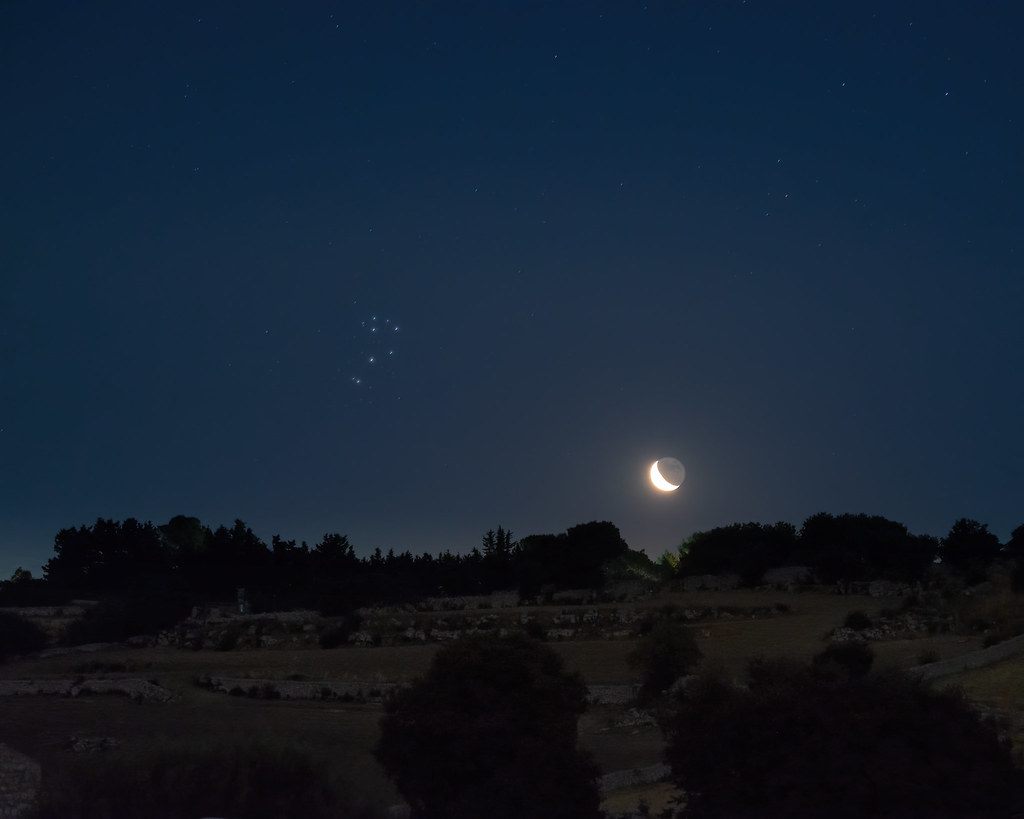 Conjunction between the Moon and the Pleiades by Salvatore Cerruto, su Flickr
Conjunction between the Moon and the Pleiades by Salvatore Cerruto, su Flickr
Description: The ashen moon rises, together with the Pleiades, over the Sicilian countryside. I slightly highlighted the Pleiades in post production to highlight their magnitude with respect to the Moon. A suggestive picture of last night surrounded by the chirping of cicadas and the smell of harvested hay.
Technical data: Nikon D800 + Tamron 100-400 f/4.5-6.3 @100mm, f/5, 8 sec, ISO-1250
Date: 2022-07-23
Location: Modica, Sicily, Italy (36.9263067,14.7904282)
Salvatore Cerruto
 Conjunction between the Moon and the Pleiades by Salvatore Cerruto, su Flickr
Conjunction between the Moon and the Pleiades by Salvatore Cerruto, su FlickrRe: Submissions: 2022 July
That's a lovely picture of the conjunction between the Moon and the Pleiades! You managed to bring out the blue color of the Pleiades, too!salvatorecerruto wrote: ↑Sat Jul 23, 2022 3:57 pm The Moon-Pleiades conjunction in the Sicilian countryside
Description: The beautiful Moon-Pleiades conjunction of this night. The Moon and the seven sisters position themselves delicately above the two olive trees. The Sicilian countryside, the chirping of cicadas, the hay cut recently, are the setting for this spectacle of the sky.
Technical data: Nikon D800 + Sigma 35mm f / 1.4 ART @ f / 2.8, 13 sec, ISO-1250
Location: Modica, Sicily, Italy
Date: 2022-07-23
Salvatore Cerruto
The Moon-Pleiades conjunction in the Sicilian countryside by Salvatore Cerruto, su Flickr
Ann
Color Commentator
-
HariSeldon
- Asternaut
- Posts: 2
- Joined: Sat Jul 23, 2022 7:21 pm
Re: Submissions: 2022 July
NGC 7293 - Helix Nebula from Buenos Aires, Argentina in NB
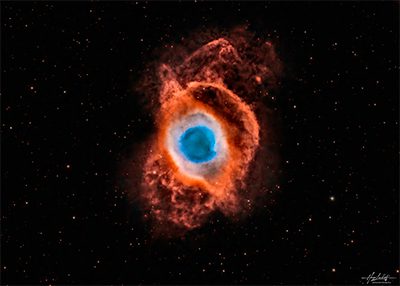
The Helix Nebula (also known as NGC 7293 or Caldwell 63) is a planetary nebula located in the constellation Aquarius.
The distance, measured by the Gaia mission, is 655 light-years.
The photograph was taken by Hugo Landolfi, in a backyard site, from an urban area near the city of Buenos Aires, called San Isidro, with a Bortle 8 sky and narrow band technique.
The data set that compose the image was taken with two cameras: a ZWO ASI 1600MM Pro and a ZWO ASI 294MM Pro in the months of July 2021 and February and March 2022.
Technical information of the photograph:
Telescope: Meade 130 APO series 6000
Mount: iOptron CEM 70
Camera 1: ZWO ASI 1600 MM Pro cooled to minus 20 degrees Celsius
Camera 2: ZWO ASI 294 MM Pro cooled to minus 20 degrees Celsius
Guide Telescope: William Optics 60 with ZWO ASI 120 mm camera
Photographic technique: Narrow band
Filters used: OIII and Ha 3nm wide bandwidth Astrodon brand filters
Photograph composed by:
ZWO ASI 1600MM PRO camera
Lights 25 x 600s in Ha
Lights 25 x 600s in OIII
ZWO ASI 1600MM PRO camera
Lights 30 x 900 in Ha
Total time integration: 15,8 Hs
Color palette: HOO
Calibration images: 30 flats per night, 30 darks, 30 flat darks and 300 bias.
Image processed with Pixinsight software by Hugo Landolfi.

The Helix Nebula (also known as NGC 7293 or Caldwell 63) is a planetary nebula located in the constellation Aquarius.
The distance, measured by the Gaia mission, is 655 light-years.
The photograph was taken by Hugo Landolfi, in a backyard site, from an urban area near the city of Buenos Aires, called San Isidro, with a Bortle 8 sky and narrow band technique.
The data set that compose the image was taken with two cameras: a ZWO ASI 1600MM Pro and a ZWO ASI 294MM Pro in the months of July 2021 and February and March 2022.
Technical information of the photograph:
Telescope: Meade 130 APO series 6000
Mount: iOptron CEM 70
Camera 1: ZWO ASI 1600 MM Pro cooled to minus 20 degrees Celsius
Camera 2: ZWO ASI 294 MM Pro cooled to minus 20 degrees Celsius
Guide Telescope: William Optics 60 with ZWO ASI 120 mm camera
Photographic technique: Narrow band
Filters used: OIII and Ha 3nm wide bandwidth Astrodon brand filters
Photograph composed by:
ZWO ASI 1600MM PRO camera
Lights 25 x 600s in Ha
Lights 25 x 600s in OIII
ZWO ASI 1600MM PRO camera
Lights 30 x 900 in Ha
Total time integration: 15,8 Hs
Color palette: HOO
Calibration images: 30 flats per night, 30 darks, 30 flat darks and 300 bias.
Image processed with Pixinsight software by Hugo Landolfi.



